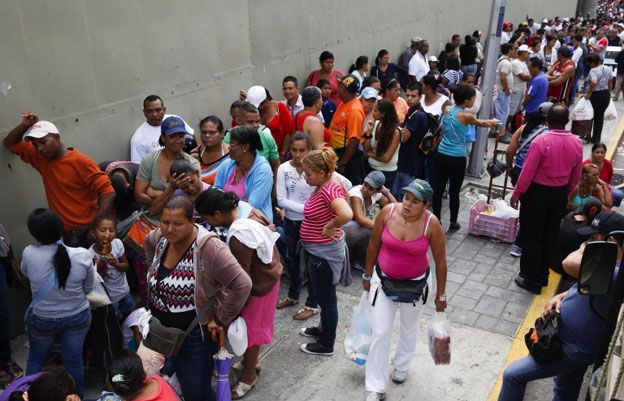The surreal world of Venezuela's queues
- Published

In Venezuela many basic goods are in short supply. The government blames America and Europe, which it says are out to destroy its economy. Others say the government has brought the problems on itself. The BBC's Ian Pannell experienced the sometimes surreal art of extreme queuing in Caracas.
The least one can expect from a creditworthy foreign correspondent is that he or she can have a decent stab at making sense of the world. In Venezuela this is more than the usual challenge.
Here are the rough basics. The Bolivarian Republic of Venezuela is run by a socialist government that has broadly speaking used - or misused - its vast oil wealth to benefit some of the people, some of the time and to keep itself in power.
A combination of woeful economic management - or mismanagement - and the steep fall in oil prices has left the government with a serious cash flow problem. And it's left the people of Venezuela standing in queues across the country every single day, often for hours at a time.
People are given time off work to queue. They get up early in the morning to queue. They queue in their lunch hour. They text each other about queues. So not surprisingly they've become very good at queuing.
As an Englishman I like a good queue - well formed, orderly, no doubting who's in front of you and who's behind.
There are many countries that don't respect these fine, ancient traditions and prefer the first-past-the-post system - involving pushing, shoving and grunting.
But on the whole Venezuela is more like Britain with its queues. The difference is that in Venezuela they're not waiting for the number 29 bus - they're queuing for milk, coffee, sugar, corn flour, cooking oil, soap and even toilet paper - all are in severely short supply.
The government regulates the price of these goods. It doesn't subsidise them - it tells the producer what they can charge. That might just about make sense in a buoyant economy but with inflation running at over sixty percent and the value of the currency plummeting, it appears producers are not only failing to make a profit but are operating at a loss. Similarly companies who export food to Venezuela have given up waiting to be paid by a government that's down on its luck and are now selling their goods elsewhere.
But the government and its supporters have a different narrative. They blame America and Europe and big business and smugglers for waging an economic war against the country, of trying to undermine President Maduro and the legacy of his predecessor, Hugo Chavez - of trying to turn the people against their government.
They've told shopkeepers to move the queues underground, into basements and subterranean car parks - apparently to protect their customers from getting sunburnt. Journalists are prevented from filming empty shelves. Shoppers have also been given instructions. You can only buy scarce goods on certain days of the week depending on what number your ID card ends in. So, for example - if it ends in a zero or a one then you can stand in line on Monday. However that doesn't necessarily mean that the milk or soap you want to buy will be available on Monday.
Another anomaly of what passes for a system is that often the shelves aren't empty at all. It's just the regulated goods that are in short supply. So if you want something else, and you have the money for one of these higher-priced goods, then you can often skip right past the queue and go straight into the shop.
Often people join a queue without even knowing what's on sale. They get into line and then they ask the shopper in front of them what they're waiting for. It's highly likely that the person in front has done exactly the same thing with the shopper in front of them.
We saw one queue that only moved forward because people at the front gave up waiting and went hunting elsewhere. But if you were further back in line - around the corner, say - you couldn't see this. You just felt the illusion of momentum or progress and were encouraged to stay and wait a little longer. On this occasion there wasn't even anything to wait for. There'd been a rumour that the shop might be getting a delivery of something - no one knew what - but in the end there was nothing - just an empty loading bay.
And so it goes on. It's a surreal symbol of a system that's broken - and frankly, makes little sense. Unsurprisingly people are angry and frustrated. On occasion this has meant that queues have degenerated into riots. And some shoppers have been robbed of their precious cargo while heading home.
If shoppers continue to believe the official line that this is caused by Venezuela's enemies, then perhaps the government may be able to ride out the growing discontent. But many Venezuelans are no longer buying it.
All-day shopping
BBC Mundo's Daniel Pardo makes it his goal to buy eight things he needs for daily life in Caracas - but it's not easy, and takes a ridiculous amount of time.
How long does it take to buy eight basic goods in Venezuela?
How to listen to From Our Own Correspondent:
BBC Radio 4: Saturdays at 11:30. Listen online or download the podcast.
BBC World Service: At weekends - see World Service programme schedule or listen online.
Subscribe to the BBC News Magazine's email newsletter to get articles sent to your inbox.